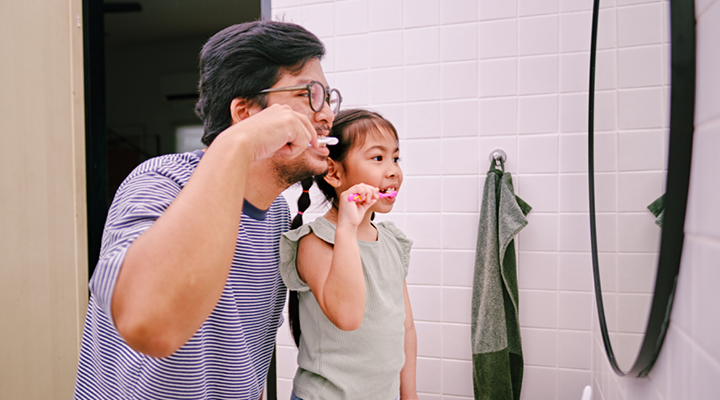*Updated February 2025
If you’ve spent time around children, you’re probably familiar with the challenge of getting them to brush their teeth. However, prioritizing your child’s oral health is essential for their overall well-being.
Believe it or not, there are steps parents can take even before birth to kickstart caring for children’s teeth. After birth, the journey to a healthy and happy smile begins much earlier than many might think.
Five ways to care for your children’s teeth
1. Good oral health starts before birth
Many mothers are unaware that their oral health habits during pregnancy can impact their unborn children’s teeth. Due to changes in hormones and symptoms of pregnancy, pregnant mothers are more likely to experience dental problems, including:
- Gingivitis: 60–75 percent of pregnant women have gingivitis because of changing hormones. Gingivitis can lead to preterm birth and low birth weight.
- Cavities: One in four pregnant women develops untreated cavities, which can be passed to the child during pregnancy or even after the baby is born.
- Children whose mothers have untreated cavities are three times more likely to develop cavities early in life.
Taking care of oral health before birth is important for both the mother and baby.
Click here for more information on pregnancy and oral health.
2. Start a good oral health care routine young
Many parents don’t realize just how important it is to establish good oral health habits early. In fact, actively caring for your children’s teeth begins the moment they are born.
Use these oral health routine tips for infants/young kids:
- After feedings, clean your baby’s mouth by wiping the gums with a gauze pad or a clean washcloth.
- Begin brushing your children’s teeth as soon as they come in. Brush twice daily (morning and evening) and use a small amount of fluoride toothpaste once the child can spit it out.
- Don’t give children any beverages other than water before bedtime or naptime, and remember to clean baby bottles after each use to help prevent baby bottle tooth decay.
- When your child is old enough to brush on their own, supervise them to make sure they are brushing all their teeth and are using an appropriate amount of fluoride toothpaste.
If you aren’t comfortable with your child brushing on their own, continue to brush for them and ask your dentist for tips and tricks to help your child pick it up.
3. Model good oral health behaviors
Children are natural imitators. They love to mimic what they see their parents do. Even when you think they’re not paying attention, they’re observing more than you realize. Use this to your advantage by setting a positive example and showing them the importance of a consistent oral health routine.
Try these tips to teach your child the correct way to brush:
- Splash your toothbrush with water.
- Apply a pea-sized amount of fluoride toothpaste.
- Hold the toothbrush at a 45-degree angle.
- Insert the toothbrush into your mouth and begin gently brushing in small circles on each tooth for a total of two minutes.
- Repeat this process twice a day.
Remind your child that although two minutes might seem like an eternity, it’s important for each tooth to be brushed and cleaned correctly.
4. Use the right oral health tools
Oral health care can only be effective if you have the proper oral health tools.
Here are some must-haves for taking care of your children’s teeth and mouth:
- Gauze pads or a clean washcloth to use on gums before teeth appear
- Fluoride toothpaste
- Child toothbrush (ADA Approved)
- Dental floss
- Regular dental check-ups
The tools needed to keep children’s teeth and mouths healthy are quite similar to those used by adults. However, it’s important to choose toothbrushes, toothpaste, and other oral health essentials designed specifically for small hands and mouths to ensure they’re both effective and comfortable for your child.
5. See a dentist early
Teaching your kids about the importance of oral health is essential, but maintaining your children’s teeth also requires regular visits to the dentist. These visits are crucial because dentists can clean areas that toothbrushes and floss can’t reach, which is especially important for children who may miss spots when brushing.
Additionally, your child’s dentist can detect early signs of tooth decay or potential cavities, helping to prevent bigger issues down the road. Regular dental check-ups set the foundation for a lifetime of healthy smiles.
Delta Dental of Colorado believes that a healthy smile is essential for a healthy life, so we have a plan enhancement just for kids called Right Start 4 Kids®. This unique plan feature that removes most of the cost barriers to dental care by providing coverage for children up to their 13th birthday at 100% coinsurance for covered diagnostic & preventive, basic, and major services, with no deductible, when in-network providers are seen.*
Click here to find a dentist and schedule an appointment today.
Prioritize your children’s teeth today for a healthier tomorrow
By taking proactive steps to prioritize your child’s oral health—from before birth to their first dental visits—you’re setting them up for a lifetime of healthy smiles. Good oral hygiene habits, the right tools, and regular dental check-ups all play a vital role in preventing cavities and ensuring your child’s overall well-being.
Remember, a little effort today can lead to big rewards for your child’s future. Start their journey to a healthy, happy smile today!
Want to learn more about pediatric oral health? Check out this blog: “Dental Care Timeline for Infants & Children”/
*Right Start 4 Kids is subject to limitations, exclusions, and annual maximum. If you are a Delta Dental of Colorado member, check your benefits booklet for specific plan coverage as it varies from group to group.

